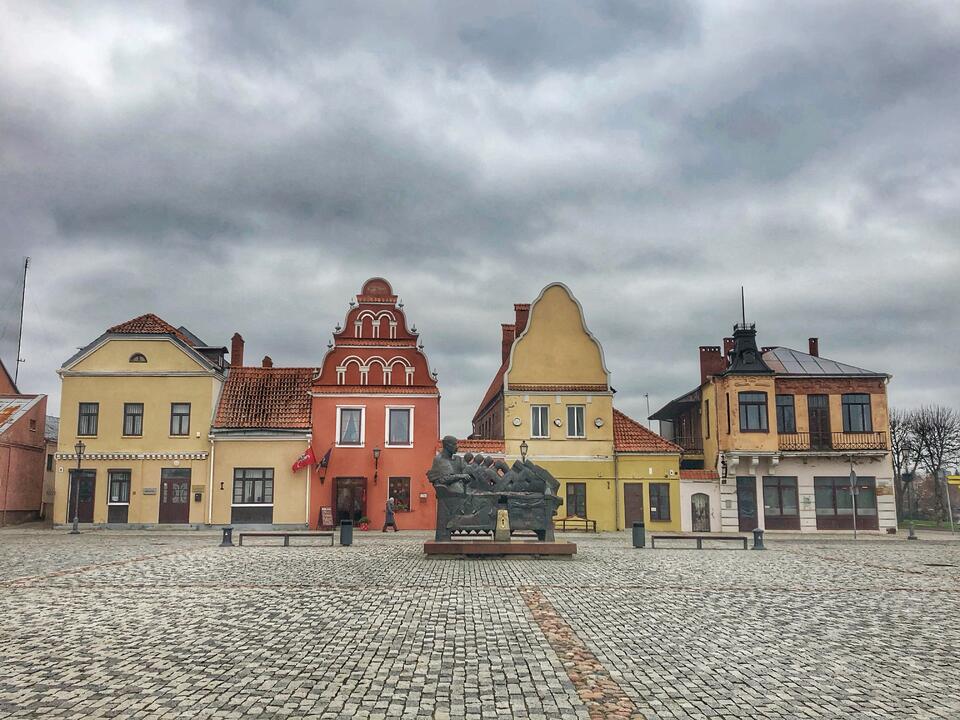„We are very glad that this conference takes place in Kedainiai and we are sure, it is a good place for an international meeting. It will help our small town to invite more tourists“, explained Valentinas Tamulis, mayor of Kedainiai at the official opening in an arty conference room at Hotel Grejus House.
Kedainiai municipality is located on the road between Riga and Kaunas. The town used to be a market hub because of the Nevezijs River. Today the town manages to keep the balance between out and in-migration, and some key industries are doing well. As well as the cultural life is blooming. It is home to several cultural institutions. One of them is the Kedainiai Vocational Training Center, an ICN partner since 2017, who organized this year’s event.
From a small town in Lithuania to global challenges - Cliff Hague, a town planning practitioner and Emeritus Professor of Planning and Spatial Development at Heriot-Watt University, Edinburgh, came to Kedainiai to talk about climate change and public policymaking. In his presentation „The Global Green Shift“ he not only introduced facts and outlined the current controversial discussion. He also talked about what needs to be done and what can be done on a local and regional level.
The earth is getting sick and so are people
„We know we have problems in terms of the way we handle the environment. The earth is getting sick and so are people caused by the effects of the climate change - that is what scientific investigations show“, said Hague and added: „Therefore sustainability is not a choice but a necessity. There is no alternative to sustainability.“
Flooded cities, sever wildfire, droughts, unstable weather, severe conflicts about water, melting glacier - yes, climate change can be a threat. But according to Cliff Hague, it can also be a driver for a green turn in heritage conversation. „Instead of new buildings, old ones can be conserved. Retain, use and re-purpose as necessary, as much of our existing building stock as possible“, encouraged Cliff Hague the participants from several municipalities in the Baltic Sea Region. He also demanded new ideas for green tourism.
Rural areas and the green shift
It is true, to focus on reducing carbon emission policymakers need to concentrate on bigger cities. Also because it is more difficult to put people on public transport in rural areas, where car dependency is a fact. But rural areas can also do their part, as Jānis Sijats, member of the Vidzeme Tourism Association and Latvian Greenways Association showed.
He inspired the audience with ideas for green tourism and introduced an Interreg project with Estonia which helped to develop new routes for biking and hiking. For that reason, old bridges have been refurbished and closed railways are re-used now. „An enormous number of people use these so-called greenways already“, said Jānis Sijats. There is also space for innovations along the way - e.g. stands with solar panels have been installed.
To exchange ideas ICN general secretary Alf Johansen suggested co-operating closer with the Greenways Association Latvia, which is already cooperating with partners in Estonia and Russia.
To understand and feel a historical heritage
Another important part of tourism are historical heritages. How these should be preserved so that local people and visitors are interested in seeing and exploring them, knows Rimantas Žirgulis, Director of Kėdainiai Regional Museum. In his presentation, he explained: „We need not only to explore but also to understand and feel a historical heritage“.
Kėdainiai Regional Museum is located in the former Catholic monastery of the Carmelites of the 18th to 19th century and offers e.g. interactive exhibitions. There is also a variety of different projects that preserve history in a creative and entertaining way.
Closely linked to Žirgulis’ ideas was a workshop that brought the participants to the heart of Kedainiai, where they not only felt the atmosphere at the old historical market square but also hugged trees. Sandy Colvine, an Independent consultant in rural development and member of Interpret Europe, the European Association for Heritage Interpretation, introduced the ICN partners to the method of interpreting local cultural heritage for more meaningful visitor experiences.
A real eye-opener for all participants who got new ideas on how to deal with heritage in a way that gives a unique experience to tourists. „It is all there, it just needs to be uncovered. People want to learn and interact, they want to contact, they want to make connections to feel fulfilled while exploring new places. We live a historic environment, it is all around us - so let’s make it visible. And involve local citizens, to strengthen their sense of belonging, value, and pride“, said Sandy Colvine.
Heritage interpretation can bring communities closer to each other
When we consider global challenges such as climate change and sustainability, our natural and cultural heritage provides a real catalyst for reflecting on the way people used to live in the past, drawing parallels with our present-day lives and helping us envisage the future - this is what Colvine taught the participants.
„Whether it’s an abandoned hilltop village, a war memorial, a disused factory or a Neolithic stone circle, heritage interpretation unlocks these deeper meanings making them accessible to young and old from all backgrounds. This is what I tried to share with attendees at the ICN Conference through an introductory workshop. In return, I discovered the members’ impressive efforts to promote cultural heritage and green tourism activities“, explained Sandy Colvine.
He believes that heritage interpretation can not only optimize the hard work of the ICN members to give visitors unique and memorable experiences but also bring local communities closer to their heritage and to each other. „There are exciting possibilities which I hope we can act on!“, encouraged Colvine.
After two days filled with various activities and lots of smart input Alf Johansen concluded: „The 12th annual ICN conference in Kedainiai 2019 managed to keep up the network mission and the network is now preparing for new projects and partnerships“.
To learn more about the different topics, please download all the presentations. And to feel the real ICN spirit join our ext conference and get in touch with the Innovation Circle Network.

